Angela Merkel: The real leader of the free world
How the reluctant German chancellor became the one person capable of stopping Putin and saving Europe. Michael Petrou reports from Berlin
German Chancellor and chairwoman of the German Christian Democrats, CDU, Angela Merkel, points with her fingers during a visit to the convention venue prior to the 27. party convention in Cologne, Germany, Monday, Dec. 8, 2014. Martin Meissner/AP;
Share
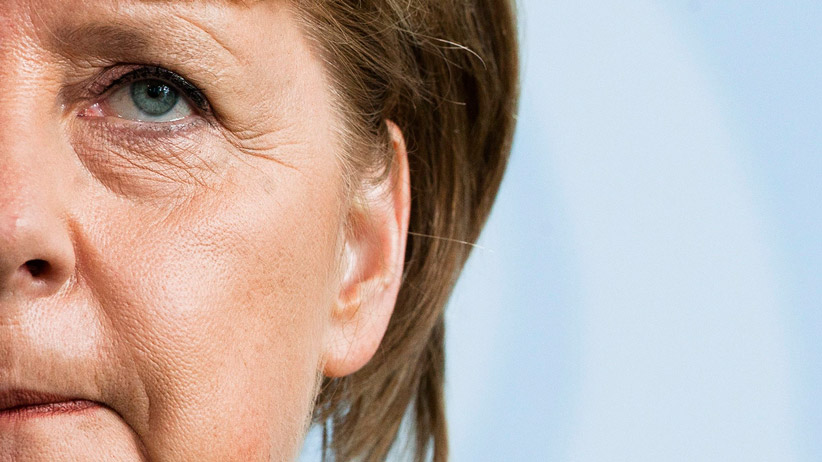
Update, Dec. 8, 2015: Time magazine has named Angela Merkel its ‘Person of the Year.’ Writes editor Nancy Gibbs: Merkel has provided ‘steadfast moral leadership in a world where it is in short supply.’ From earlier this year, here’s our foreign correspondent’s report from Berlin.
Erika Benn, an energetic, fast-talking 77-year-old woman who guided generations of East German students through the nuances of the Russian language, is sitting on a couch in her apartment in Templin, 80 km north of Berlin, reminiscing about one of her students—a girl so shy that, in the black-and-white group photographs Benn pulls from a scrapbook, she is barely visible, hiding her face among much taller bodies in the back row.
Angela Kasner, as she was known then, was “always an excellent student,” says Benn, but she had a problem. Some of the events in the Russian-language “Olympics” for which Benn prepared her students involved staged dialogue, in which competitors were expected to act out situational conversations, such as meeting a friend on the street or discussing weekend plans. Expressive students were more likely to impress the judges, but Angela appeared before them, staring at her feet, hands hanging limply at her sides.
“I was very angry at her, because she was so good, but she wouldn’t demonstrate codes of proper behaviour,” says Benn. “I was a very strict teacher. I wanted to win with my students. I wanted them to win prizes and be ambitious.”
This ambition included Angela, even though East Germany’s communist-education authorities in the ’60s and ’70s would have preferred that Benn encourage the children of workers and farmers, rather than a bourgeois pastor’s daughter.
Angela, despite her shoe-gazing performances, also craved success. She did the “considerable” amount of work Benn assigned her without complaint. And she somehow forced herself to be exuberant during competitions—speaking loudly, looking others in the eye and gesturing with her hands. None of it came naturally to Angela, says Benn. She did it because she concluded it was necessary, “because she wanted to win.” And she did.
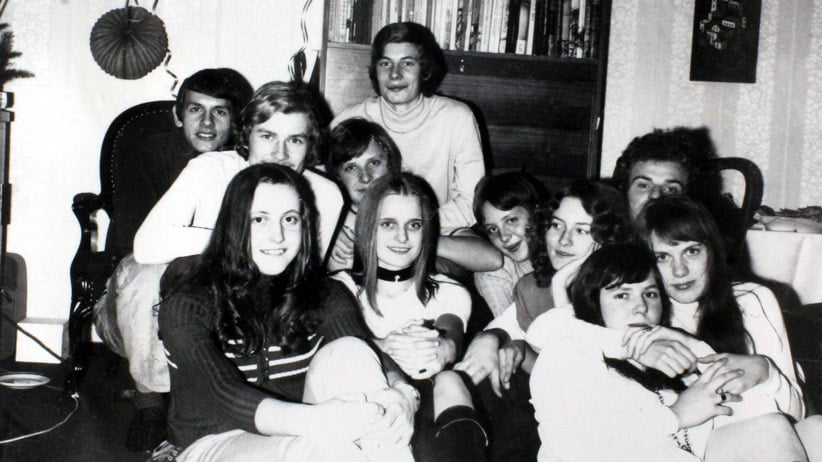
Today, Angela Kasner is Angela Merkel—chancellor of Germany, unofficial leader of Europe during a time of financial turmoil, and the West’s most important asset as it confronts a resurgent and expansionist Russia. On a continent rocked by a debt crisis that now threatens to dissolve the eurozone, she governs a country that is a comparative rock. Germany is the best hope of preventing economic collapse from accelerating in Greece and spreading throughout Europe.
The task of leading Europe through this crisis has fallen to her as a result of her political longevity after almost a decade in power, and of Germany’s economic strength. She holds power lightly, says a senior official close to her, because she understands that the rest of Europe will accept her command only if she continually involves her partners. German history casts a long shadow and prevents a chancellor, even today, from appearing the least bit authoritarian.
It is Merkel, too, who oversees efforts to negotiate an end to the devastating war between Ukrainian government forces and Russian-backed rebels who have carved out an enclave in the east of the country bordering Russia. “She’s the only person [Russian President] Vladimir Putin takes really seriously. It’s not [U.S. President Barack] Obama. It’s no one else from the European Union. It’s Merkel who really matters to him as a powerful person in this conflict,” says Stefan Meister, an Eastern Europe expert at the German Council on Foreign Relations, who advises the German chancellor and foreign ministry.
Merkel’s diplomacy on Ukraine this month included a whirlwind series of trips to Washington, Ottawa, Kyiv and Moscow, before a marathon negotiation session in Minsk involving Ukrainian President Petro Poroshenko, rebel leaders, Putin, and French President François Hollande. The negotiations resulted in a declared ceasefire and plans for a political settlement that will decentralize some political powers to the rebel enclave and, eventually, give Ukraine control of the border with Russia.
A previous ceasefire deal last year quickly fell apart, and even those involved have expressed skepticism that this one will hold. But, with the United States musing about providing weapons to Ukraine—a move Merkel is convinced will only escalate the war—and with thousands of Ukrainian troops surrounded, Merkel felt she needed to secure at least a pause in the fighting. She did it while Obama stayed in Washington.
“Her ascent is the other side of America’s decline in leadership. One thing can’t be realized without the other,” says Mariam Lau, a political correspondent at the German weekly newspaper Die Zeit. “She is governed by reason, and around her she sees especially male helplessness. [Obama’s] call to arms is a sign of helplessness, because America feels its former power slipping away. The same goes for Putin. All he has is military might. He has no economic strength. His country is falling apart. But what he does have is military power, and that’s what he wants to use.”
Domestically, Merkel is unassailable. Polls put her approval rating around 70 per cent. She leads a “grand coalition” that combines her Christian Democratic Union (CDU) and its Bavarian sister party, the Christian Social Union, with the Social Democratic Party (SPD) as a junior partner. Together, they hold more than 500 out of 631 seats in the German parliament, or Bundestag.
Annalena Baerbock, a Bundestag member with the opposition Alliance ’90/The Greens, admits they “don’t really have any medicine” against her, and are waiting for her to resign. There are no obvious challengers to Merkel within her party, and no term limits for German chancellors. Powerful figures, including Defence Minister Ursula von der Leyen, who is often discussed as a potential successor, are said to be loyal. Merkel will step down when she feels like it, not when she’s forced.
In the meantime, Merkel has governed Germany and, increasingly, Europe, with the same pragmatic approach that won her victory in those Russian competitions. She recognizes what must be done and does it, whether it comes naturally to her or not. “It’s absolutely not her style to lead,” says Lau. “She negotiates and calms other people’s temper tantrums. That she can do. But she doesn’t like to lead, and she doesn’t pontificate. She doesn’t verbalize leadership. She doesn’t like all these things. And still, she has to do it. There’s no one else. There simply isn’t.” ![]() tweet this
tweet this
Merkel was never hungry for the trappings of power: the wealth, the prestige and the deference. She doesn’t need adoration. She lives modestly and doesn’t look down on her colleagues in Europe, nor fellow citizens in Germany. And yet—and in part because of those qualities—she’s emerged as the one figure uniquely suited to deal with two of the biggest crises facing the West today.
Erika Benn, her former teacher, is proud of what Merkel has accomplished, though not overly impressed. The chancellor could afford better clothes, she says. And Merkel’s not so special. Other former students have also achieved much, including one who is a dentist and looks after Benn’s teeth. It’s unlikely that Merkel, one of the least puffed-up politicians ever to govern at such a high level, would want higher praise.
Angela Merkel grew up among the mentally disabled. Shortly after she was born in 1954, Merkel’s father, Horst Kasner, a Protestant pastor, moved his family from Hamburg, in West Germany, to the village of Quitzow, in East Germany. Three years later, they relocated to Templin, a town surrounded by forests and lakes and a Soviet military garrison. Here, Merkel spent most of her youth. Her family had a home at the Waldhof, a church-administered complex of homes and workshops where disabled Germans lived and worked. Horst ran a pastoral college on the grounds.
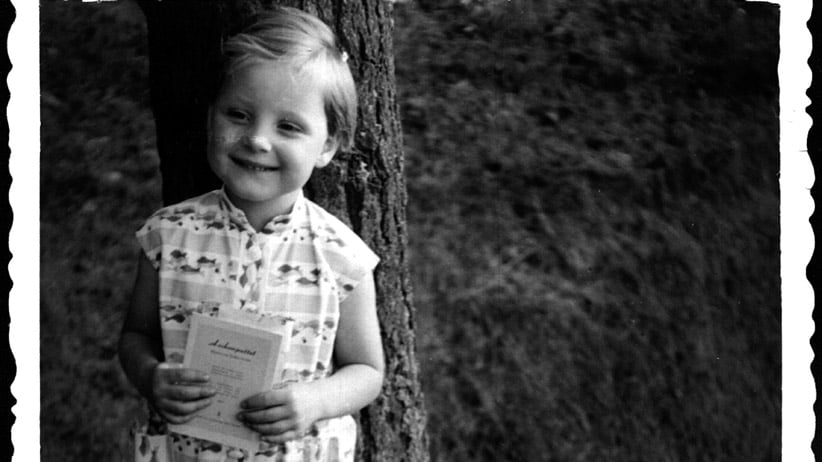
Merkel lived here with her parents, brother and sister. She once told the photographer Herlinde Koelbl there was “no shadow” over her childhood. Ulrich Schöneich, a former mayor of Templin who helped to run the institution, remembers that Merkel treated those who lived there with compassionate normalcy, as did her mother, Herlind.
Her father, Horst, on the other hand, “was not an easy man,” says Schöneich, and didn’t engage much with those at the Waldhof.
According to Benn, Merkel was withdrawn as a girl, and a little bit isolated, partly on account of living at the Waldhof, which was slightly removed from the centre of town. She wasn’t particularly popular, but nor was she bullied. Her peers, says Benn, respected her academic talents.
Merkel joined the Free German Youth (FDJ), a movement associated with the ruling Socialist Unity Party of Germany for those aged 14 to 25. Alan McDougall, a University of Guelph historian, says that for East Germans who wanted to go to university, membership in the FDJ was “pretty much a prerequisite.”
There has still been the odd accusation that Merkel compromised herself by joining the group. A 2014 book, The First Life of Angela M., suggested she was once secretary for “agitation and propaganda” in a branch of the movement, rather than simply a cultural secretary who organized social outings, as Merkel had claimed.
This type of criticism has never found much traction among Germans—especially among those who grew up in East Germany, where tens of thousands of people either worked or were informers for the Stasi East German secret police. Merkel did neither of these things.
Even Schöneich, who didn’t join the movement and whose educational aspirations were thwarted as a result, understands Merkel’s decision. “I think it was mostly because of her career goals,” he says. “I don’t judge her for this. It was the thing to do. Ninety-nine per cent of the people in the German Democratic Republic did this.”
When she was awarded the Presidential Medal of Freedom at the White House in 2011, Merkel said that when she was a young girl living in East Germany, she dreamed of freedom. “Yearning for freedom . . . moved people to overcome their fears and openly confront dictators, such as in East Germany and Eastern Europe,” she said that night in the Rose Garden. But Merkel wasn’t one of them, and has never pretended she had been. She found herself living in a dictatorship and made what she judged to be a prudent accommodation.
Merkel studied physics at the University of Leipzig and earned a doctorate in 1978. She was living in East Berlin and working as a researcher the night the Berlin Wall fell in 1989. She did briefly cross to the West, but only after keeping her regular Thursday-night sauna appointment. If this was an event she had long dreamed about, she doesn’t seem to have been in much of a hurry to realize it.
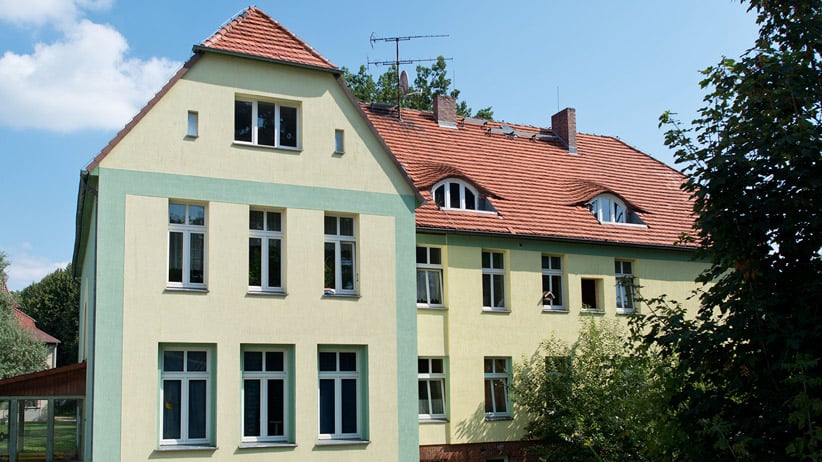
Exactly why Merkel chose to pursue politics is not clear, but her career took off once the wall fell. She joined the new Democratic Awakening party, which then merged with the East German Christian Democratic Union and, finally, with its West German counterpart following reunification. Merkel, at age 36, contested the first post-reunification federal election in 1990 and entered the Bundestag as a CDU member. She was quickly appointed to chancellor Helmut Kohl’s cabinet and remained one of his protégées until his defeat in the 1998 federal election.
When Kohl was implicated in a party-donations scandal, Merkel, whom Kohl had often patronizingly called “my girl,” showed strategic ruthlessness. She publicly criticized Kohl and advocated a new start for the party. She was elected CDU leader in 2000, paving the way for a failed run at the chancellorship in 2002, followed by a successful one in 2005.
Around the same time as Kohl’s long career as chancellor was coming to an end, in 1998, Merkel married chemist and professor Joachim Sauer, whom she had met years before, in a private ceremony. (An earlier marriage to Ulrich Merkel had ended when she was still in her 20s, but she kept his name.)
According to Schöneich, who remains close to Herlind Kasner, Merkel casually informed her mother about her second marriage while cooking at the stove on New Year’s Eve: “By the way, Joachim and I got married yesterday.”
Today, Merkel and Sauer live in what, from the outside, looks like a plain Berlin apartment in a building next to the River Spree. “Prof. Dr. Sauer” is the name on buzzer. There’s a café downstairs that sells basic lunch food and cakes. It closes early. A police car is often parked about a block away, with an officer or two sometimes standing on the sidewalk. There are no gates or barriers. If the police talk to anyone, it’s to give them directions to one of several nearby museums. Foreigners don’t know that Merkel lives here; Germans don’t care.
From the steel and glass dome of Berlin’s Reichstag, home to Germany’s parliament and symbol of the country’s democratic rebirth, it’s possible to see an imposing monument to fallen Soviet soldiers who died by the thousands in the Battle of Berlin during the final weeks of the Second World War. Many are buried beneath it.
The monument grounds are swept clean, and there are fresh flowers laid before it. This is proper and appropriate. It is also remarkable. Some 30,000 German civilians also died in that battle alone. And the Soviet Union’s victory in the Second World War led directly to East Germany’s communist dictatorship. Yet most Germans feel little or no resentment.
“What could you expect?” one shrugged, discussing the fate of German prisoners of war who were not released by the Soviet Union until years after the fighting ended. Germany’s invasion of the Soviet Union was genocidal. That knowledge, that collective memory, continues to affect Germany’s relationship with Russia. “There’s a feeling that we have to make compromises with the Russians because of our own history, because of what we did with the Russians,” says Meister, of the German Council on Foreign Relations.
More recent history is also influential. Stefan Reinecke, a journalist at the newspaper Die Tageszeitung, says German reunification “is seen partly as a gift” of former Soviet leader Mikhail Gorbachev, because he didn’t try to stop it.
The personal lives of Merkel and Putin in many ways reflect the intertwined histories of their two countries. While Merkel studied Russian language and culture during the Cold War, Putin studied German. He was working for the KGB and was stationed in Dresden when the wall came down.
The two can converse in both Russian and German, and do so regularly. Last September, the Kremlin reported Putin had spoken with Merkel 35 times so far that year—more than three times the number of phone conversations he had had with Obama. “She has a deep understanding of the Russian mentality, the Russian language. I think she understands him,” says Thomas Stritzl, a CDU Bundestag member.
The extensive economic ties between Moscow and Berlin have always required Russian and German leaders to have a functional relationship. But there were moments early in Merkel’s chancellorships when it appeared there was potential for a deeper bond. At the 2008 NATO summit in Bucharest, Merkel blocked an American plan to offer Georgia and Ukraine the prospect of full membership in the alliance—something Putin strongly opposed. The Russian leader told Merkel he would never forget what she had done.
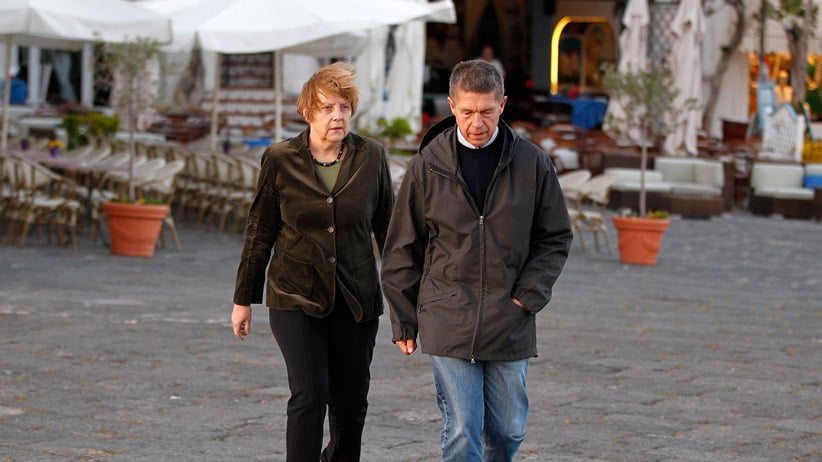
That doesn’t mean the two ever shared the same macho bonhomie as did Kohl and Gorbachev, or the greasier friendship of Putin and former chancellor Gerhard Schröder—now employed by a subsidiary of Russian state-owned energy company Gazprom—but there was at least a sheen of mutual respect and perhaps trust.
That’s all gone now, because of Russian aggression in Ukraine, and Putin’s denials about it. “She was very disappointed that he lied to her several times, on some agreements, on the question of how Russia supports the separatists,” says Stefan Liebich, a Bundestag member and foreign affairs spokesman for the opposition, the Left party. Today, the senior official close to Merkel describes the chancellor’s relationship with Putin as one that is without illusions.
Yet Merkel never scaled back her diplomatic efforts with Putin, even as she must have felt the personal insult of betrayal. Indeed, she flew to Moscow in an effort to prepare the ground for a deal at a time when there was no guarantee she would be successful. Taking this sort of risk is uncharacteristic for Merkel, and it’s not obvious why she did it. Asked what motivates his boss, Peter Tauber, general secretary of the CDU, says, “peace.”
There may be some truth to that, but Merkel is not a reflexive pacifist. She has, with broad parliamentary support, kept German troops in Afghanistan as part of a NATO-led training and advisory mission. Germany’s deployment was recently extended for another year.
What’s driving Merkel’s diplomacy on Ukraine may not be so much a desire for peace as fear of a much larger and bloodier war on Europe’s doorstep.
In Sydney, Australia, last November, Merkel gave a speech that recalled the outbreak of the First World War 100 years earlier. “Looking back to the time leading up to 1914, one thing in particular stands out: the lack of communication among the political elites of European states and the complete failure of diplomacy,” she said. “We can’t undo what happened back then. However, we can—and indeed, I would say we must—learn the right lessons from this. In 1914, national self-importance and cold-blooded military logic pushed aside responsible politics and diplomacy. In 2014, in contrast, we in Europe are striving to engage in dialogue and find peaceful solutions—no matter how difficult the negotiations may be.”
The deal struck last week in Minsk might be considered something of a victory for Merkel, an affirmation of her consensus-seeking style of international leadership. But any fair judgment must also consider what exactly was agreed to, what’s been accomplished on the ground, and what the additional ramifications might be, especially in Ukraine.
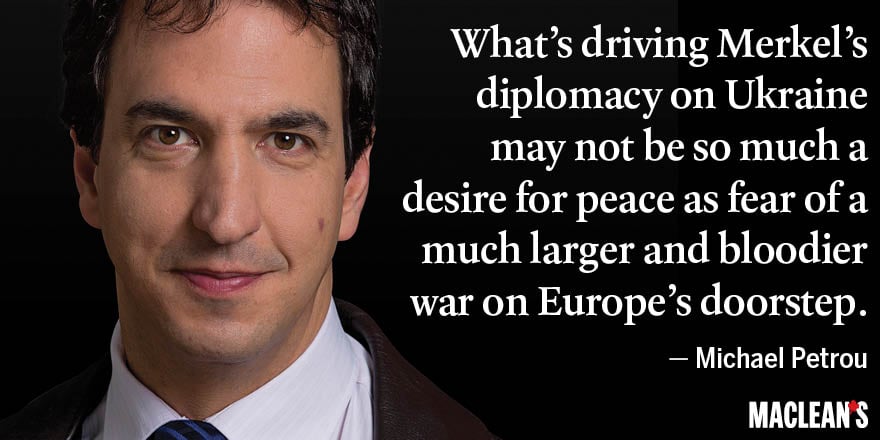
The early signs are not good. Despite the ceasefire, rebel fighters this week pressed their attack against Debaltseve, a key transport hub that was in the hands of Ukrainian troops when the deal was signed. Rebels also prevented monitors from the Organization for Security and Co-operation in Europe from entering the town. And both sides missed a Monday deadline to begin withdrawing heavy weapons from the front lines.
Dmitri Trenin, head of the Carnegie Endowment for International Peace in Moscow, doubts the agreement will be fully implemented. The rebel enclave will not be integrated into Ukraine, he predicts, and the border between rebel-controlled territory and Russia will not be turned over to the Ukrainian government. A likely outcome, he said in press call, is a so-called “frozen conflict,” without active fighting but also without political peace.
Even if the agreement is implemented, it erodes Kyiv’s control over its territory, and legitimizes a Moscow-sponsored insurrection on the soil of a European neighbour and ally. What the rebels have gained at the negotiating table was made possible because Russia invaded a sovereign country. And this is after it annexed the Ukrainian region of Crimea last March—an act of aggression that those negotiating with Russia have implicitly accepted won’t be soon reversed.
Merkel herself was subdued in her assessment of what was accomplished in Minsk. The agreement, she said, offered “a glimmer of hope—no more, and no less.”
Some American politicians have urged their government to provide weapons to Ukraine—an option Obama has not rejected. These calls may grow louder if the ceasefire collapses. But they have little resonance in Germany. “For the Americans, it’s very easy to talk about Russia and Ukraine, if you have an ocean between you and Russia, and you have an almost non-existent economic relationship,” says Niels Annen, an SPD parliamentarian and foreign affairs spokesman. Annen is close to Foreign Minister Frank-Walter Steinmeier, who also hails from the SPD. “And you criticize your closest European ally, who not only agreed to, but designed the sanctions we imposed, and agreed to accept significant economic losses as a result. This is hypocritical.”
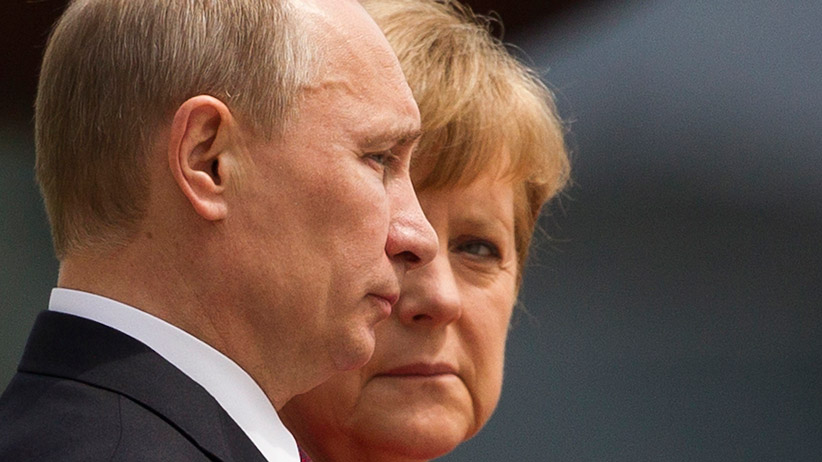
The Russians, says Annen, will not allow the rebels in Ukraine to be defeated militarily. “Mr. Putin showed this two times. Do I like his behaviour? No, it’s outrageous. But if we are not prepared to go to war with a nuclear-armed power, what we have left are economic sanctions, political unity and patience.”
There is a complex of old buildings in Angela Merkel’s hometown of Templin that used to be a boarding school. The buildings are now dilapidated, the deep yellow paint chipped, some windows are boarded up. But the structures themselves, surrounded by forest, are stately and beautiful.
Schöneich, the former mayor, is on a committee with Merkel’s mother, Herlind Kasner, that hopes to establish a new school here. Schöneich says it would welcome students from across the continent and celebrate European values.
Schöneich says he and Kasner were recently discussing help they might request from Germany’s education minister. They planned to send a letter, but worried it would be lost or ignored among the voluminous correspondence the ministry surely receives. “Angela’s coming home for Christmas,” Kasner said, according to Schöneich. “Maybe I should ask her to deliver the letter.”
Schöneich says he agreed, but Kasner later told him Merkel had refused. He wasn’t surprised. Few in Germany would be. There’s never been a whiff of corruption or scandal surrounding Merkel. Even using her influence to ensure a letter from her mother reaches its intended destination is apparently something she won’t contemplate. It’s one of the reasons Germans trust her.
“The main reason for her popularity is that people feel safe with her,” says Ralph Bollmann, a journalist and author of the recent Merkel biography, The German: Angela Merkel and Us. “She is elected in Germany because people think: ‘We don’t want to know exactly what is the problem in the eurozone crisis, or how to deal with the Ukraine crisis. We’ll vote for Mrs. Merkel and she’ll do that for us so that we don’t have to think about it.’ ”
In Merkel, Germans see traits they want to believe are their own: thrift, modesty, rationality, a willingness to work hard. “She represents all the things that we think are typically German,” says Bollmann. Germans like to imagine Merkel cooking potato soup, he says. It’s a plausible image.
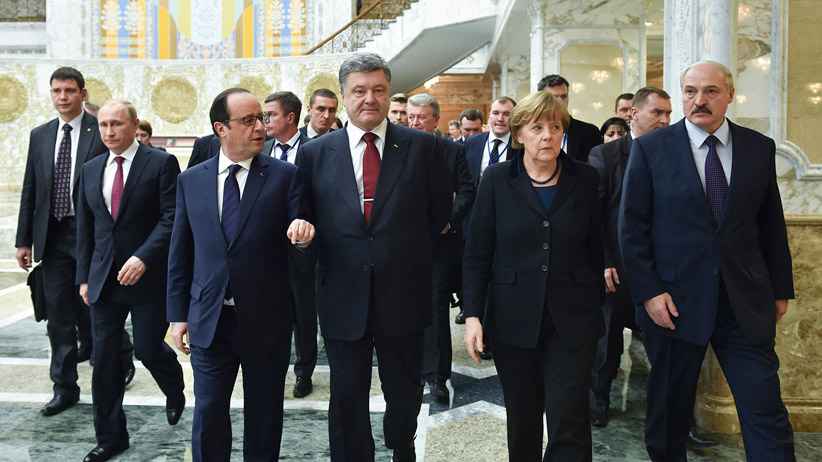
These perceived values have helped Merkel convince Germans of austerity’s necessity as a strategy for dealing with the euro crisis. Since 2010, several countries in the eurozone that were struggling to refinance government debt have received bailout loans from the European Commission, the European Central Bank and the International Monetary Fund, in exchange for enacting strict austerity measures.
These measures have hit Greece especially hard. Unemployment has soared and pensions have shrunk. A newly elected Greek government, led by Prime Minister Alexis Tsipras of the leftist SYRIZA party, wants to renegotiate the terms of Greece’s bailout. He’s demanded Greece’s debt be reduced and has promised to increased public spending in an effort to promote growth.
Merkel has stuck to her belief that austerity is the only way out of the crisis. Germans may feel some solidarity with citizens of countries suffering as a result. But they also believe that the supposedly German qualities of frugality and financial restraint that they see advocated by, and reflected in, their chancellor work, and should be exported.
That Merkel doesn’t project a sense of grandeur makes Germans more comfortable with their chancellor playing a bigger role internationally, including regarding the euro crisis. Outside Germany, it may also take some of the sting out of Germany dominating Europe again. “Her modesty is the condition on which Germans and everyone else accept this leadership. It’s precisely because she doesn’t want to lead that German leadership is conceivable,” says Lau.
Merkel’s leadership isn’t welcomed everywhere, of course. She is often likened to Hitler on banners and signs carried by anti-austerity street-marchers in Greece. A Spanish newspaper ran (and later withdrew) a column that made the same comparison. But even as caricature, the slur rings hollow. Merkel barely seems presidential, let alone imperialist or dictatorial.
Those who know Merkel describe her as less guarded in private, a little more chatty and prone to make jokes, but not all that different than she is in public. There’s no sense of a cruel or pompous personality lurking behind the public persona.
Merkel is also too smart not to realize the political usefulness of unpretentiousness and self-deprecation. Baerbock of the Greens recalls Merkel attending a parliamentary committee on which Baerbock sat last year. Merkel had just skipped a United Nations climate change summit in New York and was challenged on why she didn’t attend.
According to Baerbock, Merkel responded by saying she was tempted to go because the actor Leonardo DiCaprio would be there, but concluded she could just as easily watch one of his films. “Everyone had to laugh, and then the point was gone,” says Baerbock. Merkel had neutralized the issue with a joke.
It’s the sort of personality trait that makes a politician difficult to despise, all soft edges and amiability. “I’m not so against Mrs. Merkel, and I would be glad if she were a Social Democrat,” says Ulrike Finckh-Krämer, an SPD Bundestag member.
Those who have campaigned against her know it doesn’t mean she is weak. “We underestimated her once,” says Annen of the SPD. “We will never do it again.”
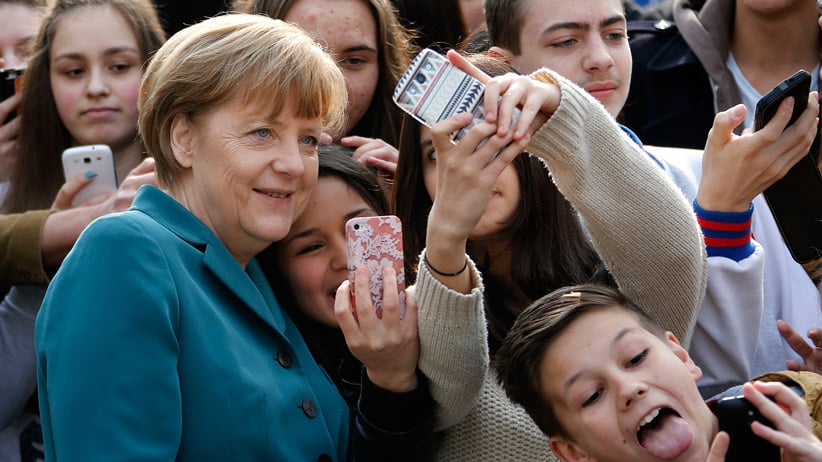
In her Rose Garden speech on accepting the Presidential Medal of Freedom, Merkel betrayed a hint of complacency in her previous life. While growing up in East Germany, she said, she looked forward to reaching 60 (the retirement age for women), when she would be allowed to travel to the United States. This was not someone who dreamed of tearing down walls, but of waiting until they no longer applied to her.
Some of Merkel’s critics accuse her of still being reactive, of lacking vision. And it’s true that there is a managerial streak in her approach to politics. “A stable government is a value in and of itself,” she said in a July address.
Merkel’s chancellorship is so far without grand and singular achievements. Her one-time mentor, Helmut Kohl, championed the euro and presided over German reunification. Willy Brandt, another of her predecessors, moved the world in 1970 when he fell to his knees in Poland at a monument to victims of the Warsaw Ghetto Uprising. It was an apology and an implicit plea for forgiveness that meshed with his outreach to Eastern Europe. Merkel lacks the capacity or will for similar transcendent gestures.
But, after three election victories and nearly a decade in office, Merkel’s chancellorship has acquired its own sizable weight and impact. She has governed longer than most of her peers in the world—with a notable exception in President Putin of Russia. Her accomplishments are less obviously demonstrative than those of some who came before her.
But Merkel has kept Germany wealthy and stable, as many of the countries around it struggle. Germany’s economy is the largest in Europe. Its January unemployment rate of 6.5 per cent was the lowest since reunification. The French rate, by comparison, is above 10 per cent. And, in Spain, it is above 20. Germany’s strength has resulted in a steady increase in its standing and influence in the world.
This, in turn, has forced upon Merkel the issues that may come to define her political career: the eurozone crisis, and the war in Ukraine. She is seen by Putin as the means to reach Europe, and the West looks to her to lead its engagement with Russia. Both sides have no choice but to respect her.
The future of the eurozone will also be shaped in large part by Berlin. The election of SYRIZA in Greece has presented a serious challenge to the austerity strategy advocated by Merkel. There are growing calls to try other tactics, including debt forgiveness in exchange for structural reforms. Merkel isn’t yet wavering. But whether she opts for flexibility or holds firm, Europe will follow her lead.
Both the eurozone and Ukraine are confounding crises, and neither is close to being resolved. But the worse these problems get, the more the world looks to Germany’s reluctant leader to solve them. Other world leaders are powerful. Merkel is something close to indispensable.